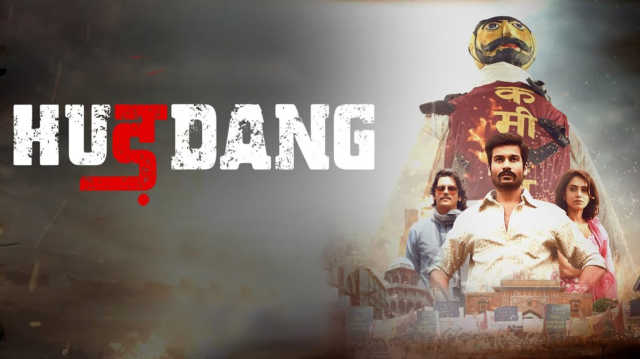
Suyog Zore
Mumbai, 09 Apr 2022 16:53 IST
It is quite clear that writer-director Nikhil Bhat has skimped on the research into caste and caste-based reservation.

After The Kashmir Files (2022), we have another film in Hurdang (2022) that tries to manipulate a significant political and historical incident from 1990 to suit the current political dispensation.
The film, written and directed by Nikhil Bhat, claims to delve into the student protests in many parts of the country against the implementation of the Mandal Commission report that allowed reservation in government jobs for the Other Backward Classes (OBCs).
Student leader Daddu Thakur (Sunny Kaushal) is a hooligan in Allahabad, Uttar Pradesh, and right-hand man of local politician Loha Singh (Vijay Varma). Daddu helps Loha make money by selling leaked question papers to students at exam time. He has a girlfriend Jhulan (Nushrratt Bharuccha) who wants to run away with him and get married as soon as possible. But their romance hits an obstacle in Daddu's role as student leader when the government proposes to implement the Mandal Commission’s recommendation to reserve 27% jobs in government and the public sector for the Other Backward Classes (OBCs). Loha Singh sees this as the perfect opportunity to exploit Daddu for his own gain.
Writer-director Bhat unapologetically offers an upper-caste opinion on the question of reservation for the OBCs. In the film's entire 122 minute duration, we don't get to see any representation of lower-caste students and their point of view except for one scene where they are portrayed as negative characters. The film attacks reservation for the OBCs without bothering to analyse what led to it in the first place.
Halfway through, it becomes clear that Bhat has not cared to research the subject and simply wants to give viewers the message that reservation on the basis of caste is wrong. If Bhat had cared to dig into the subject, it is quite likely he would not have made this film at all. Hurdang offers neither data nor analysis to support its stand. So in one scene we have a character saying, "A brahmin's son can be poor, so can someone belonging to other castes. Hence we should protest against caste-based reservation."
Towards the end, the film, too, suggests that caste-based reservation should be replaced by reservation on economic criteria, as if caste privilege and caste-based discrimination are complete fiction in this country.
The film's hero is unapologetic about his unlawful activities, hooliganism and casteist mindset. In fact, on more than a few occasions, the film glorifies his hooliganism and toxic masculinity. I was simply unable to empathize with Hurdang's protagonist. Not only was I put off by his rowdy behaviour but also failed to understand why the romantic subplot involving Bharuccha was included. Perhaps the filmmaker thought that no matter how problematic his protagonist, the audience would empathize with him if he had a girl rooting for him.
The display of such a character on the big screen warrants careful inspection of the narrative itself. Daddu is a guy who not only uses his caste privilege to break the law, but also to escape any significant consequence for such behaviour. In one scene he beats up police officers who go to arrest him in the college hostel. In another, he is openly selling medical exam question papers. These scenes actually just prove his upper-caste privilege. Forget beating up a cop, If any lower-caste student were to even dare to talk back to the police, he could find himself rotting in jail without trial for god knows how many years.
With nothing solid in the screenplay, the film's direction is a letdown. Bhat could have explored the dilemma of Daddu's character, but he just brushes aside the thought of adding some nuance to the character, leaving it severely underdeveloped.
The film doesn't tell us anything about who Daddu is outside of college. Or how he got into politics. We don't even know if he has a family or is an orphan. In the entire 122 minutes of the film, he is not alone for even a second to contemplate his actions. He is always in the company of students who are not even his friends, Loha Singh or Jhulan. Because of this, there is never any chance for the viewer to build an emotional bond with Daddu. Except for his political ideology and brash attitude, we know nothing about this Thakur youth. The viewer is left to sympathize with him simply on the basis of her ideology.
The film does get a shade better towards the climax, but it is already too late by then. The only positive in the film is the performances by the lead cast. Sunny Kaushal pulls off the swag and carefree attitude of the upper-caste brat Daddu without going overboard. Vijay Varma, as always, does a wonderful job. Nushrratt Bharuccha, sadly, doesn't have much to do.
Hurdang was released in theatres on 8 April 2022.
You might also like

Review Hindi
Jogi review: Diljit Dosanjh-starrer is more like a thriller revolving around 1984 riots
The Ali Abbas Zafar film takes you by surprise with the riot angle brought in much earlier in the...

Review Hindi
Matto Ki Saikil review: Prakash Jha leads this sentimental saga of socio-economic inequality
Written and directed by M Gani, the Hindi film is a patchy yet heartbreaking look at the bleak class...

Review Hindi
Jhini Bini Chadariya review: A moving lamentation for the holy city of Varanasi
Ritesh Sharma’s hard-hitting film lays bare the social fabric of the city and the growing...

